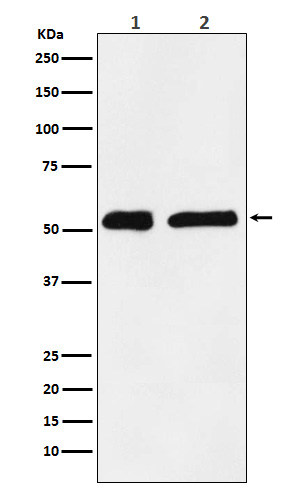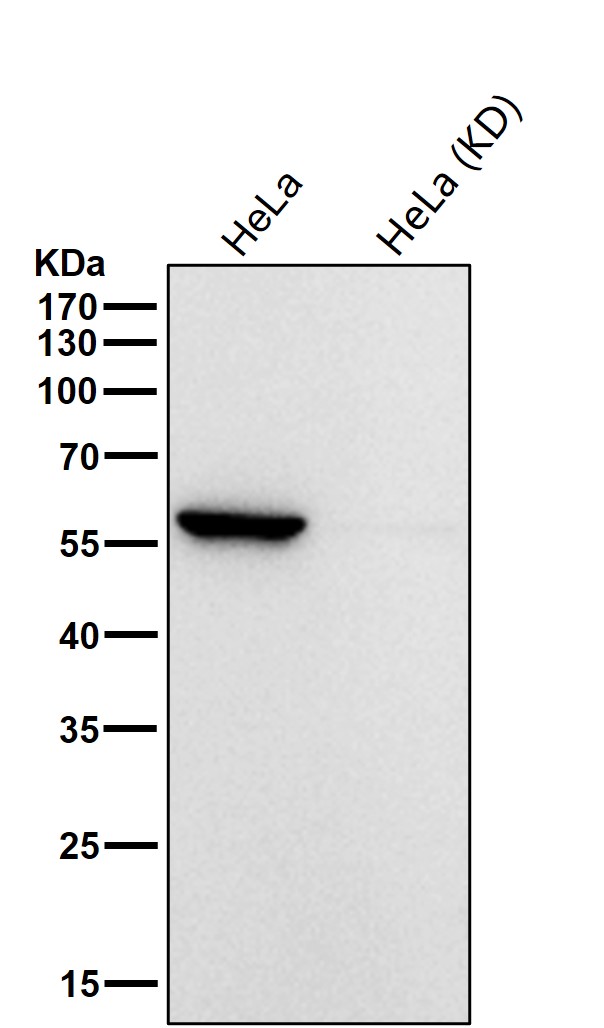

| WB | 咨询技术 | Human,Mouse,Rat |
| IF | 咨询技术 | Human,Mouse,Rat |
| IHC | 咨询技术 | Human,Mouse,Rat |
| ICC | 技术咨询 | Human,Mouse,Rat |
| FCM | 1/20-1/100 | Human,Mouse,Rat |
| Elisa | 咨询技术 | Human,Mouse,Rat |
| Aliases | QIP2; RCH1; IPOA1; SRP1alpha;;KPNA2 |
| WB Predicted band size | 58 kDa |
| Host/Isotype | Rabbit IgG |
| Antibody Type | Primary antibody |
| Storage | Store at 4°C short term. Aliquot and store at -20°C long term. Avoid freeze/thaw cycles. |
| Species Reactivity | Human,Mouse,Rat |
| Immunogen | A synthesized peptide derived from human KPNA2 |
| Formulation | Purified antibody in PBS with 0.05% sodium azide,0.05% BSA and 50% glycerol. |
+ +
以下是关于KPNA2抗体的3篇参考文献的简要总结:
1. **文献名称**: *KPNA2 promotes tumorigenesis by regulating the proliferation, invasion, and metastasis of cancer cells*
**作者**: Wang CI, et al.
**摘要**: 研究揭示了KPNA2在多种癌症中异常高表达,并通过调控细胞周期蛋白(如Cyclin D1)和EMT通路促进肿瘤增殖、侵袭及转移。抗体用于检测其在组织样本中的表达水平,证明其与患者预后不良相关。
2. **文献名称**: *Nuclear transport protein KPNA2 modulates oxidative stress-mediated signaling in cancer*
**作者**: Altan B, et al.
**摘要**: 该文献利用KPNA2抗体进行免疫共沉淀实验,发现KPNA2通过与Nrf2等抗氧化信号分子相互作用,调控肿瘤细胞对氧化应激的响应,进而影响化疗耐药性。
3. **文献名称**: *KPNA2 as a diagnostic biomarker for early-stage hepatocellular carcinoma*
**作者**: Li Y, et al.
**摘要**: 研究通过免疫组化(使用KPNA2特异性抗体)发现,KPNA2在肝癌早期组织中显著高表达,可作为潜在诊断标志物,其表达水平与肿瘤大小及血管浸润呈正相关。
4. **文献名称**: *Functional characterization of KPNA2 in p53 tumor suppressor nuclear import*
**作者**: Fagerlund R, et al.
**摘要**: 通过敲低KPNA2并结合抗体阻断实验,证明KPNA2在p53蛋白核转运中的关键作用,其缺失导致p53滞留于胞质,削弱DNA损伤修复能力,促进肿瘤发生。
以上研究均通过KPNA2抗体进行分子机制或临床相关性分析,涵盖其在肿瘤诊断、治疗及信号调控中的作用。
KPNA2 (Karyopherin Alpha 2), also known as Importin Alpha 1. is a member of the importin α family that mediates nucleocytoplasmic transport by binding to proteins containing nuclear localization signals (NLS) and facilitating their entry into the nucleus via the nuclear pore complex. It plays a critical role in diverse cellular processes, including cell cycle regulation, gene expression, and antiviral responses. KPNA2 is particularly notable for its overexpression in various cancers, such as breast, lung, and hepatocellular carcinoma, where it correlates with tumor progression, metastasis, and poor prognosis.
KPNA2 antibodies are essential tools for detecting and quantifying KPNA2 protein levels in research and diagnostics. These antibodies are widely used in techniques like Western blotting, immunohistochemistry (IHC), and immunofluorescence (IF) to study KPNA2 expression patterns, subcellular localization, and interactions with cargo proteins. Monoclonal and polyclonal KPNA2 antibodies are available, often validated for specificity through knockdown or knockout controls. Their applications extend to investigating KPNA2's role in cancer biology, viral infections (e.g., HIV), and neurological disorders, as dysregulated nuclear transport is implicated in these conditions. Reliable KPNA2 antibodies are critical for understanding its functional mechanisms and exploring its potential as a therapeutic target or biomarker.
×